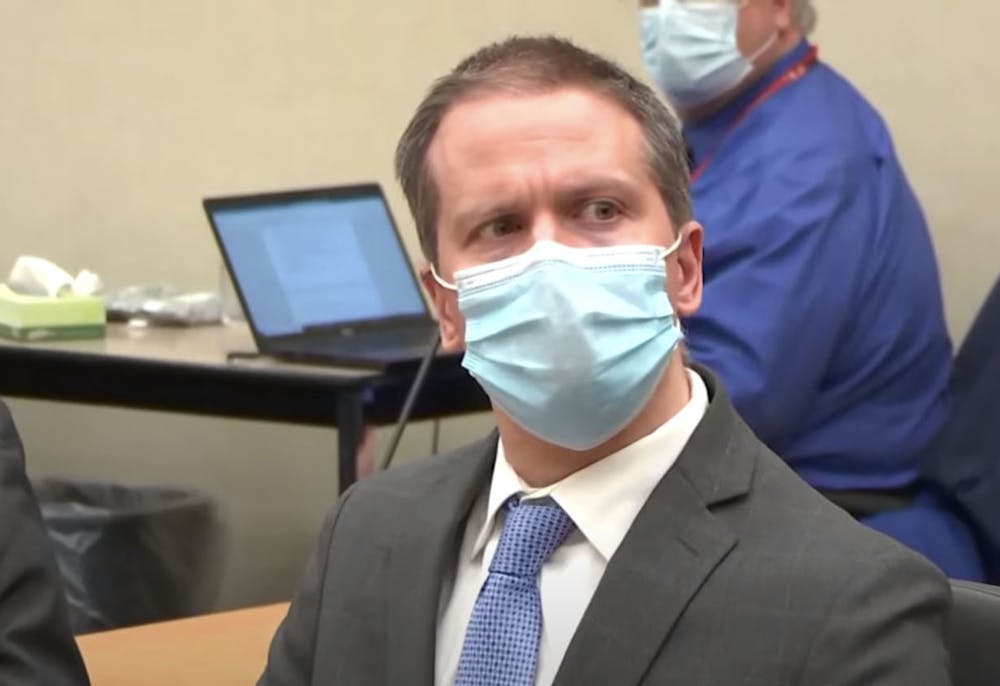A jury convicted former Minneapolis police officer Derek Chauvin of second-degree murder, manslaughter and third-degree murder Tuesday for the death of George Floyd on May 25, 2020.
Chauvin could be sentenced up to 40 years in prison, according to the Tribune News Service. The jury debated for 12 hours before delivering the verdict.
Three IU experts reflected on the role of video evidence, police testimony and jury diversity in the trial and the trial’s future effects.
Jakobi Williams, African American and African diaspora studies and history associate professor, said he felt relief after hearing Chauvin was found guilty of all three counts because there was a sense of accountability.
“Police officers usually aren’t held accountable,” Williams said. “I was happy to see that that was the case this time around.”
A research effort conducted by Bowling Green State University’s Philip Stinson and Chloe Wentzlof found that since the beginning of 2005 through June 24, 2019, there were 104 nonfederal law enforcement officers — defined by possessing the general powers of arrest — who have been arrested for murder or manslaughter following an on-duty shooting in which an officer shot and killed someone in the United States.
Of those 104 officers, 35 have been convicted of a crime resulting from the on-duty shooting, according to the same study.
In the past, Williams said, the prosecution has typically underperformed in their role when prosecuting police.
“The job is to prosecute the officer for the crime that was committed, not play defense attorney and tell the public why you can't get an indictment,” he said.
Williams said there is still more work to be done.
“We still have a lot of work to do” he said.
Another important part of the trial was the prosecution's ability to use fellow officers to testify against Chauvin, he said.
“That's unprecedented,” Williams said. “That doesn't happen in many of these cases.”
According to a 2000 study done by the National Institute for Justice, 24.9 percent of surveyed officers believed that whistleblowing, revealing private information about an organization often related to wrongdoing according to Britannica, was not worth it. In the same study, 52.4 percent of surveyed officers agreed or strongly agreed that it was not unusual for police officers to “turn a blind eye” to other officers' misconduct.
Williams said the police union usually comes to the officer’s defense. Due to the international outcry over Floyd’s murder, Williams said police distanced themselves from Chauvin to show the officer was the problem, not policing.
“But his actions was just so brazen and so arrogant, and just so egregious that it makes sense for officers to take a step back and acknowledge that his actions were way over the pale of what officers are supposed to do,” Williams said.
David Kim, IU-East lecturer in criminal justice, said the blue wall of silence, or the brotherhood of police officers that does not bring unlawful actions into the public sphere, was broken during the trial when Minneapolis chief of police said Chauvin didn’t follow protocol.
“There was occasions during the trial that police officers were outright against Chauvin’s actions,” Kim said.
Kim said Chauvin’s case was different from previous cases due to the amount of video evidence provided by witnesses.
“Because of the rise in body-worn cameras and the rise in individuals with cell phones, I think that increased the amount of evidence and proof,” he said.
Kim said the evidence was a crucial factor in the outcome of the trial and the case will change how witnesses and police officers provide evidence in the future.
“It's going to increase the amount of video evidence that's going to be provided in most cases that's going against police officers in the future,” Kim said.
Stephanie Whitehead, IU-East associate professor of criminal justice, said this is a rare moment because police aren’t often generally held accountable for their behavior. She said people are happy to see officers held accountable for their actions.
According to Reuters Investigates, in excessive force cases, the courts favored police 44% of the time between 2005-2007 and 57% of the time from 2015-2019.
She said she believes the case would add to the movement against qualified immunity. Qualified immunity protects government officials from lawsuits alleging the official violated another party’s rights, according to Cornell Law.
“Police officers do need to be questioned and held accountable,” Whitehead said.
Whitehead said the realization of the necessity of a diverse jury would have an effect on future cases.
“The jury is definitely going to play a role and diversity does matter in terms of just having, you know, different perspectives from different life experiences in that room,” Whitehead said.
The outcome of the case, Whitehead said, is going to give people a little breathing room to see that things can change but there’s recognition that one case isn’t justice itself.
“There's a lot more work that needs to be done,” Whitehead said.




